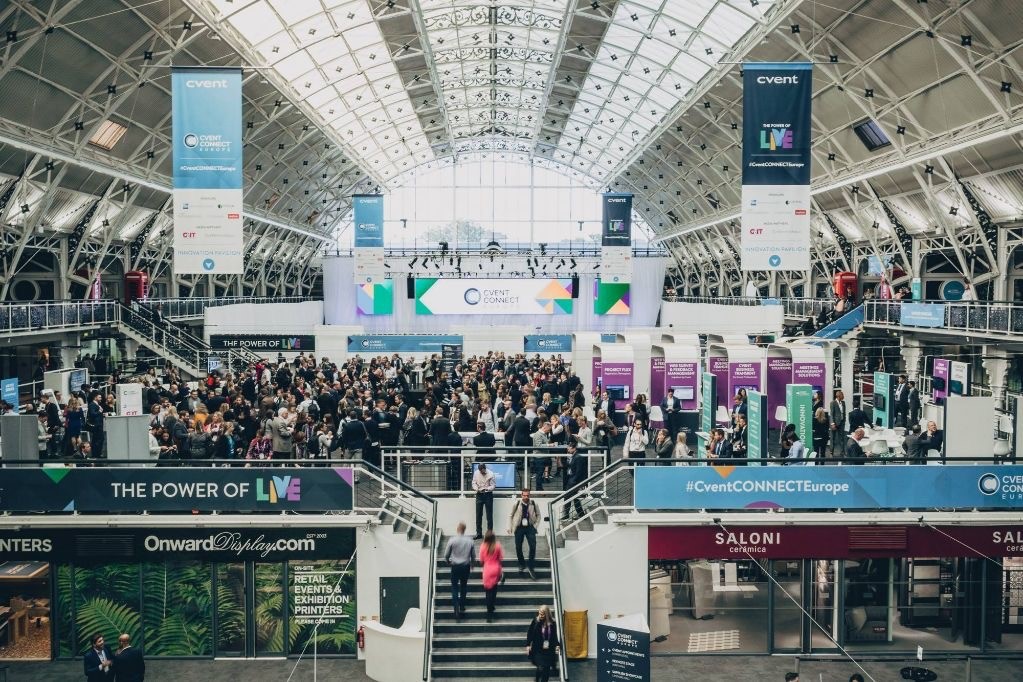Our Blog

Cvent CONNECT 2018: The future of event technology
Cvent CONNECT Europe is an annual highlight in the TTA calendar and this year’s event was no exception. While I had every intention of summing up my recent attendance in one blog, the packed programme gave me so much food for thought that I’ll be sharing it in snackable posts over the coming weeks.
Futuristic flights of fancy
So, first things first: technology is advancing at a breakneck pace and our industry is undergoing monumental change. I was excited to hear about various innovative concepts that are being trialled around the globe to ease the burden of travel. Among the most futuristic is the prospect of hypersonic planes that could reduce transatlantic flight times to just an hour, and flying trains with detachable wings – yes, really – to enable boarding closer to passengers’ homes.
Taking the hassle out of travel
However, the future is already upon us, as emerging technologies are gaining a firm foothold in the forward-thinking air transport industry. Forgotten your passport? No problem – passenger identity can now be confirmed biometrically through fingerprints and iris scanning. Rushing to catch your flight? How about motorised rideable luggage to whisk you to your gate three times faster than you can walk! Meanwhile CT scanners are being deployed in airports to inspect carry-on luggage so you can sail through security. For frequent flyers, smart luggage tags with embedded RFID chips enable end-to-end bag tracking and promise to make lost luggage a thing of the past.
Meanwhile, geo-fencing – location-based targeted messaging – can transform interactions with attendees “en route” by pushing contextual notifications to their mobile device or wearables as they arrive at or leave a specific place. For example, as they approach their hotel, they could receive an alert to let them know their bedroom is available for check-in, or automatically get the password for the Wi-Fi. Although with 5G set to be rolled out globally from early 2019, hotel Wi-Fi may soon become as quaint as the desktop computer or polaroid camera!
Using tech to maximise live experiences
So, with novel ways to enhance the traveller experience either in the pipeline or already starting to gain traction, how can we elevate the attendee experience itself? After all, it’s our job to consider how available technologies can maximise live events, yet our industry seems to be more cautious than many when it comes to adopting new tech-enabled practices.
Even in the lead-up to an event, technology can play a key role in early engagement: at tech industry conferences, events are promoted through ad retargeting and holographic invitations to raise awareness among their audiences.
We always look to maximise attendees’ time at the event itself. Online check-in stations, now ubiquitous, eliminate the tedium of queuing for a room key, name badge or agenda. It’s likely that facial recognition will take over in due course as algorithms get progressively better at identifying individuals through machine learning.
In the field of human-machine interactions, the use of voice recognition is already starting to overtake touch user interfaces – as early as 2020, Google estimates that half of all online searches will be made by voice, thanks to the likes of Siri and Alexa, particularly as linguistic accuracy is currently at around 90% and improving all the time. Live translation is now available and it’s amazing for an international audience to be able to follow a speaker in real-time with cost-effective simultaneous interpretation.
You may already have experienced augmented reality which can give us new ways to manage the flow of people by interacting with computer-generated overlays, such as a 3D floor plan, as they move through the real world. Alternatively, a beacon-based positioning system can assist wayfinding by superimposing turn-by-turn directions onto the camera view of users’ mobile devices.
Virtual reality, used to create simulated environments, is set to transform events beyond recognition in the coming years with fully immersive, interactive tools and bespoke 3D worlds. No longer experimental, VR’s use cases include product demonstrations, memorable brand experiences, dynamic virtual tours, or training – ideally suited to kinaesthetic learners who prefer to get hands-on.
With the advent of 360-degree video, compelling event sessions can be live-streamed to enable those who can’t be there in person to get closer to the action. And with breakthroughs coming thick and fast in holographic telepresence, remote participants will soon be able to share a sense of proximity, intimacy and interpersonal space in real-time. Imagine being able to shake hands with a human hologram or “HumaGram” – living, deceased or fictional – at a virtual awards ceremony!
Using data to shape future experiences
Finally, following the event, we have an abundance of data generated by participants that we can use to inform and shape future live experiences. We can now track and integrate digital and physical footprints to understand where attendees hang out, for how long and with whom, which sessions or speakers were most engaging, and more. While this might sound a little Orwellian, attendees have no cause for concern: with the introduction of GDPR, individuals are empowered to explicitly give consent and remain in control of their data, including the right to be forgotten.
A human-technology partnership
Despite all of these great strides in technology, we believe real-world events are here to stay. Nothing competes with the power of live, shared experiences and face-to-face interactions. Humans are sociable and curious creatures, and we develop a deeper understanding of our world through personal connection.
At TTA, we love hearing our clients recalling those “we were there” moments, so our approach is to apply technology where appropriate and beneficial to create meaningful experiences that change people’s perceptions, behaviours, jobs and lives.